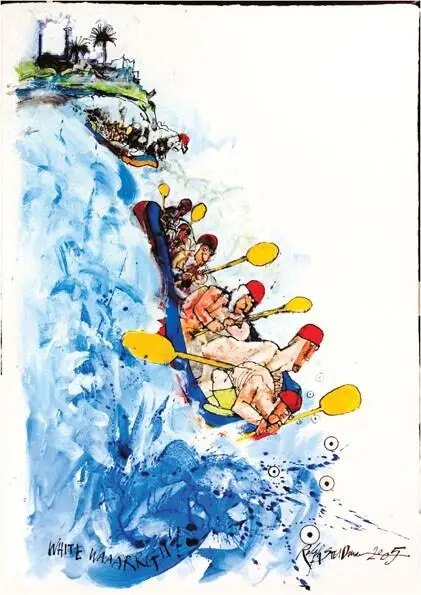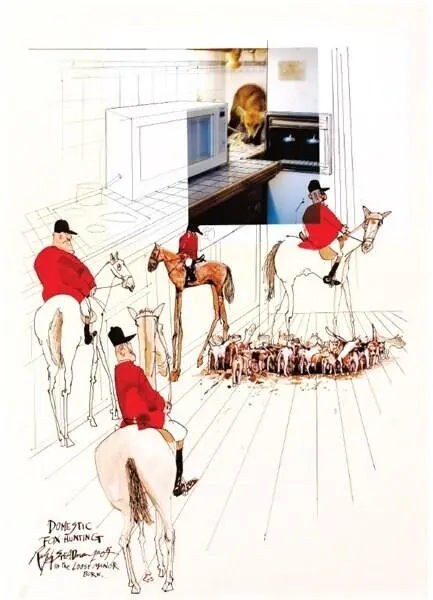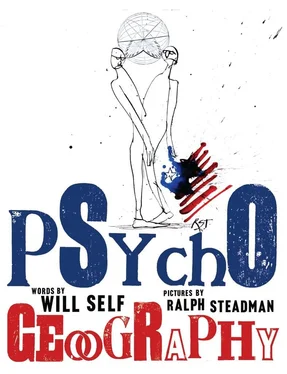And seldom sourer than in Tully, which, to be frank, is a dump. The old 1950s storefronts are warped and mildewed; the tiny grid of commercial premises feels sunk in desuetude. Within a few blocks the Queensland equivalents of pound shops and greasy spoons have given way to overgrown subdivisions and clapboard houses on knock-kneed stilts. Obese, hydrocephalic types crawl along the sidewalks, looking as if they’re on their way to audition for a remake of Deliverance .
The only tourist attractions in Tully are the sugar mill — which does a tour — and the Big Boot. The Big Boot is the same height as the flood waters which covered Tully during the early 1970s, and from its six-metre summit there are commanding views of. . the sugar mill. I’m all for the sugar mill tour but the adolescents are revolting — they want to go white-water rafting. You can see their point; beyond Tully the Walter Hill Range of mountains pushes 1,000 metres up into the cloudy skies, rocky summits draped in rainforest, vertiginous gorges, tumultuous cataracts — a vast wilderness of adrenalin.

I don’t want to go white-water rafting. I’m not scared — I can’t even get close to being scared; it’s just that I’d sooner have my penis severed, varnished and put on sale in a provincial gift shop than entrust my frail form to a tiny rubber boat bouncing down the Tully River, which, given that this is the wettest dry season northern Queensland has ever seen, is approaching full spate. Still — it’s not about me, is it? So we go white-water rafting.
We’re issued with wet suits and crash helmets and climb into a bus which jolts us through the cane fields and then up a winding road that coils between dripping trees festooned with lianas. The guides are all limber fellows with plenty of piercings and pigtails. They keep up a running commentary the whole way there: if you fall in stay on your back so that if you hit anything it’ll be your bottom that takes the impact; choose yourselves a team and get acquainted — your lives will depend upon each other; you must listen to the guide in your boat and do what he says — again, your lives depend upon it. This isn’t, it occurs to me, recreation at all; it’s survival.
Our team is me, my three adolescents and a mismatched couple from Brisbane: Kurt and Pauline. Kurt is a rugged, good-looking chap. As we carry our raft over the rocks to the river he tells me that the choice was between this and parasailing. Pauline, on the other hand, is so frail, pretty and anaemic that her choices — which manifestly were ignored — must have been between a well-heated art gallery and dabbing eau de cologne on her blue-veined temples.
Our raft guide, a Kiwi called Dan with bleached bits in his hair, urges us to pick a name for our team. ‘Somethin’ rousing,’ he enjoins us, ‘so that when we’ve shot a rapids we can shout it out!’ ‘Er, how about Deliverance?’ I suggest in a desultory fashion, and Kurt, to my considerable relief, sniggers appreciatively. ‘Yeah, OK,’ says Dan, ‘although what I had in mind was, like, “Doggy Style”. So that I could shout out, “How d’you like to do it?” — and youse guys would all clash your paddles and shout “Oooh-ooh! Doggy Style!”’ As we slip into the brown and white sinewy embrace of the Tully River, I don’t exactly feel that Dan and I are on the same wavelength. But, realistically, it’s too late for a meeting of minds, because we’re in the raft, floating towards the rapids and he’s telling me what to do not only for my own survival — but to stop the rest of the team from being dashed to pieces on the rocks.
The strange thing is that it works — the team that is. We paddle when Dan shouts, ‘Paddle!’ We back-paddle when he shouts that. We shift from side to side in the raft, and as it teeters then plunges over falls we get down in it with our paddles held to attention. At the rapid called ‘Wet & Moisty’ I fall out of the raft — and the team gets me back in. At ‘Double D-Cup’ my daughter falls out midway through the cataract and yet is hauled to safety. Whatever our differences concerning nomenclature — it’s clear that Dan has the measure of the Tully Gorge.
Oliver Rackham, the magisterial historian of the English countryside, has several bees in his bonnet. One of them concerns the word ‘forest’. If you believe Rackham there’s no necessary connection between ‘trees’ and ‘forests’. Forests are areas set aside for the hunting of wild game — deer, boar and suchlike — while wooded areas of country are, doh! woods. Forests are characterised by their ancient laws and royal-appointed officers, while woods feature toadstools, crapping bears, fairy rings and farouche child abusers.
I love Rackham’s writing on the countryside. To read his accounts of woodland management, the structure of field systems and even soil drainage is to have the godlike sensation that when it’s all tarmaced over and there’s a Tesco Metro where every copse used to be, one could simply reconstruct the whole palimpsest of our biota, using Rackham as a set of instructions. My friend Con has slightly disabused me concerning the omniscience of Rackham. He too is a disciple and once made a pilgrimage to the great seer of the bucolic at Corpus Christi, his Cambridge college. It transpired that Rackham obviously took his agenda from what he could see from the window of his rooms; and that his masterwork, The History of the Countryside , should really be called The History of the Bit of Countryside I Can See from my Window .
If I animadvert on Rackham it’s because of what happened to Mr & Mrs Ralph this week. They awoke during the night to the sound of a loud crash echoing through the vastness of Steadman Towers. On arising they found a trail of bite marks and paw prints leading through the elegant chambers and along the marble colonnades. A large, silk-covered ottoman had been reduced to a tatterdemalion; a turd had been deposited in the toilet. Eventually they cornered the interloper in the kitchen. How a fox cub had had the wit to become housetrained after only that very night entering a house for the first time is a source of wonder to us all.

Now, Rackham’s take on foxes is sanguine to say the least, given that he views the two cataclysmic events in the English countryside to have happened during the Iron Age, and then in the late nineteenth century. The first was the clearing of the primary woodland, and the second was the turning over of whatever little spinneys remained to the intensive rearing of game birds. Set beside these awesome reductions in biodiversity, the artificial preservation of the fox in order that it may be hunted stands as an amusing little appendix. And preserved it has been. Rackham’s hunch is that it would have been extinct in the early-modern period were it not such good fun cornering it on horseback, then watching it being torn to shreds by doggies.
The irony that the fox was preserved for so long that it managed to adapt to the growing urbanisation of England cannot be stressed enough. Over the last few years, during which this environmental appendix became so inflamed that it poisoned the body politic, it was hilarious to hear the fox-hunting lobby bleat on about how they had to hunt foxes in order to a) keep their numbers down, b) keep countryside folks’ numbers up. In essence this was the same as a talking hamster telling you that it was essential he kept running round and round in order to preserve his wheel.
Читать дальше














